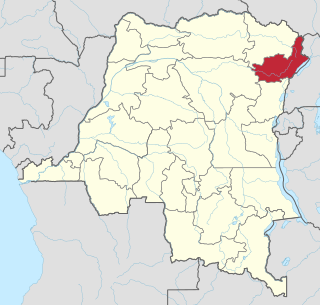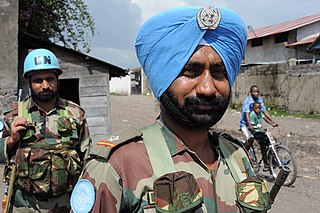Related Research Articles
Amba or AMBA may refer to:

The Kakwa people are a Nilotic ethnic group and part of the Karo people found in north-western Uganda, south-western South Sudan, and north-eastern Democratic Republic of the Congo, particularly to the west of the White Nile river.
The dozen Luo, Lwo or Lwoian languages are spoken by the Luo peoples in an area ranging from southern Sudan to southern Kenya, with Dholuo extending into northern Tanzania and Alur into the Democratic Republic of the Congo. They form one of the two branches of the Western Nilotic family, the other being the Dinka–Nuer. The Southern Luo varieties are mutually intelligible, and apart from ethnic identity they might be considered a single language.

The Hema people or Bahema (plural) are an ethnic group of Nilotic origin who are concentrated in parts of Ituri Province in the eastern Democratic Republic of the Congo.
Sanga may refer to:
The individual member states of the African Union (AU) coordinate foreign policy through this agency, in addition to conducting their own international relations on a state-by-state basis. The AU represents the interests of African peoples at large in intergovernmental organizations (IGO's); for instance, it is a permanent observer at the United Nations' General Assembly.

The Lugbara are a Central sudanic ethnic group who live mainly in the West Nile region of Uganda,in the adjoining area of the Democratic Republic of the Congo (DRC) and in Morobo County Republic of South Sudan. They speak the Lugbara language, a Central Sudanic language similar to the language spoken by the Madi, with whom they also share many cultural similarities. They are also found in South Sudan where they are known as Mundu and other names.
Keliko or Kaliko is an ethnic group from South Sudan, Democratic Republic of the Congo ,and Uganda. Most members of this ethnic group are Christians. They speak the Keliko language, which is a Nilo-Saharan language. The population of this group likely exceeds 10,000.

Rwenzururu is a subnational kingdom in western Uganda, located in the Rwenzori Mountains on the border with the Democratic Republic of the Congo. The kingdom includes the districts of Bundibugyo, Kasese and Ntoroko. Rwenzururu is also the name given to the region the kingdom is located in.
Bangala is a Bantu language spoken in the northeast corner of the Democratic Republic of the Congo, South Sudan and the extreme western part of Uganda. A divergent form of Lingala, it is used as a lingua franca by people with different languages and rarely as a first language. The estimated number of speakers varies between 2 and 3.5 million. It is spoken to the east and northeast of the area where Lingala is spoken. In Lingala, Bangala translates to "People of Mongala" this means people living along the Mongala River
The Moru–Madi languages of the Central Sudanic language family are a cluster of closely related languages spoken in South Sudan, the Democratic Republic of Congo, and Uganda. Moru is spoken by 100,000 people, and Ma'di is spoken by twice that number. The most populous languages are Aringa of Uganda, with close to a million speakers, and Lugbara, with 1.6 million.
The Konzo, or Konzo, are a Bantu ethnic group located in the Rwenzori Mountains of southwest Uganda. Numbering 850,646 in the 2014 census, they live on the plains, hills and mountain sloping up to an altitude of 2,200 meters. Traditionally agriculturalists and animal husbanders, they farm yams, beans, sweet potatoes, peanuts, soy beans, potatoes, rice, wheat, cassava, coffee, bananas, and cotton, while keeping goats, sheep, and poultry. They speak the Konjo language and practice traditional religions and Christianity. Konzo speakers also live on the western slopes of the Rwenzori range in the Democratic Republic of the Congo.
Baamba may refer to:
The Amba are a people located in border area of the Democratic Republic of the Congo and Uganda south of Lake Albert in the northern foothills of the Rwenzori Mountains. On the Uganda side, they are found in Bundibugyo District. On the Congolese side, they are located in the Watalinga and Bawisa subcounties of Beni, South Kivu. Numbering 42,559 on the Uganda side in the 2014 census and 4,500 on the Congolese side according to a 1991 SIL International estimate, Ethnologue lists their total population as 40,100. Agriculturalists, the Amba traditionally cultivate plantains, millet, maize, sweet potatoes, peanuts, rice, coffee, cotton, and cassava, while raising goats and sheep. The Amba practice Christianity.
Nande, also known as (Oru)Ndandi and Yira, is a Bantu language spoken in the Democratic Republic of the Congo.

United Nations Security Council resolution 1304, adopted unanimously on 16 June 2000, after recalling resolutions 1234 (1999), 1258 (1999), 1273 (1999), 1279 (1999), 1291 (1999) and 1296 (2000) on situation in the Democratic Republic of the Congo, the Council demanded the immediate withdrawal of Ugandan, Rwandan, Congolese opposition and other armed groups from Kisangani in the Democratic Republic of the Congo.

United Nations Security Council resolution 1445 was adopted unanimously on 4 December 2002. After recalling all previous resolutions on situation in the Democratic Republic of the Congo, the Council expanded the military component of the United Nations Mission in the Democratic Republic of Congo (MONUC) to a level of 8,700 military personnel–up from 4,250–in two task forces.
Bera (Bira) is a Bantu language of the Democratic Republic of the Congo. It is close to Amba.
The Nyanga are a Bantu people in the African Great Lakes region. Today they live predominantly in the Kivu region of the Democratic Republic of the Congo, near the frontier with Rwanda and Uganda. They speak the Nyanga language, also called Kinyanga, which is one of the Bantu languages. There are about 150,000 speakers of Nyanga according to a 1994 census, but most are also fluent in Swahili. Their national epic is the karisi Mwindo.
The following lists events that happened during 2014 in the Democratic Republic of the Congo.
References
- ↑ Amba at Ethnologue (18th ed., 2015)
- ↑ Hammarström, Harald; Forkel, Robert; Haspelmath, Martin, eds. (2017). "Amba (Uganda)". Glottolog 3.0 . Jena, Germany: Max Planck Institute for the Science of Human History.
- 1 2 3 4 Jouni Filip Maho, 2009. New Updated Guthrie List Online